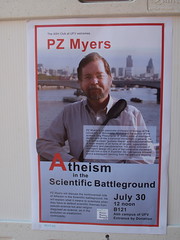Biology professor  and godless liberal PZ Myers was in town last Friday to give two lectures: one at the University of the Fraser Valley in Abbotsford, in the afternoon, one at UBC in the evening. The advertised title for both was “Atheism in the Scientific Battleground”, but the focus in each was a little different.
and godless liberal PZ Myers was in town last Friday to give two lectures: one at the University of the Fraser Valley in Abbotsford, in the afternoon, one at UBC in the evening. The advertised title for both was “Atheism in the Scientific Battleground”, but the focus in each was a little different.
Speaking in Abbotsford Prof. Myers focused on how religion, as an attempt to understand and gain knowledge about the world, has been a complete failure. It has never given us useful insights about the world, has never competed with science. He went on to give a few examples, starting with developmental biology (his specialty, after all): the Church-favoured preformation theory (ie: that beings already existed fully-formed in either sperm cells or ova and only needed to grow bigger) was only laid to rest in the 19th century when new scientific findings led to the conclusion that embryos emerge from an unformed mass of cells through a complex process.
“As you know, I’m a fairly aggressive atheist. Because somebody has to be.”
Yet these findings—at least in humans—is still not really accepted by pro-life folks. To them, since life and identity begin at conception, even a fertilised egg cell is already a full-fledged human being. PZ showed us pro-life billboards spouting inane platitudes such as embryos having ears and a nose at 3 weeks, therefore abortion is wrong. Mind you, these posters never show actual embryos, only cute smiling toddlers. And they don’t mention that though embryos at 3 weeks do have little bumps and ridges that will develop into actual ears and facial features, they also have proto-gills and tails.
Myers argues that it’s social science which must decide who’s protected. But religion has failed to provide good answers, and “life begins at conception and barely-humanoid embryos are already cute little babies” is not a good answer.
And then there’s evolution. I don’t think I need to go into too much detail about creationism, or the Creation Science Museum in Kentucky where PZ rode a triceratops, but let’s just say that PZ’s thesis holds up there too. The Biblical creation story is, quote, “Zoology written by a guy who doesn’t care about zoology”.
Lest people believe he’s always singling out Christianity, PZ had a few words about Islam—Quranic astronomy and Quranic embryology, both of which are quite worthless. There was one Muslim in the audience, who argued that Mulsims believe in God and evolution, and that Muhammed wrote about the Big Bang, but these are exactly the same arguments used by fundies desperate to see science in the Old Testament: interpreting vague bits of a creation story in light of current scientific theories. Nothing new here.
(Incidentally, this was my first time at UFV. It’s a pretty little campus and, even though I got there late, I’m glad I made the 90+ min trek from downtown. Snapped a few photos for your pleasure, including a killer view of Mount Baker.)
There are good reasons to be dogmatic about evolution.
The UBC lecture focused more on atheism. In fact, the title in his slides was “Science and Atheism: Natural Allies.” PZ started off talking about evolution, and how at this point nothing could prove it wrong. It’s never going to happen. Why? The theory certainly isn’t complete, there are still many unanswered questions and new data being discovered all the time. But it is not a tentative hypothesis. It’s a solid, well-established theory that’s withstood 150 years of criticism. If somehow some fantastic new findings came along that revolutionised the field, it would not lead to the death of evolution. It would lead to a more complete theory that would include the present one as a special case, just as the theory of relativity includes Newtonian mechanics as a special case.
So yes, there are good reasons to be dogmatic about evolution.
Next, he asked: what would convince us that God exists? Weeping statues, Jesus or the Virgin Mary appearing on burnt toasts, a vision of a 900 ft. tall Jesus? But all these things have non-divine explanations, including (in the last case) “I’m going out of my mind.” So it looks like there’s no way to prove God exists (or, to be fair, does not exist). So given that, what does it mean to be an atheist? The dictionary definition’s no help, since it only talks about belief, or lack of, or belief in lack of. But there must be a reason for disbelief, just as there is for belief.
The atheism PZ is endorsing is based on scientific thinking. This is a positive thing, unlike popular perceptions of atheism, based on rebellion or nihilism or what have you. Science, when you get right down to it, is an error-correction mechanism for our flawed and easily-fooled brains, which evolved to find food to eat, avoid being eaten, and try to get laid. They were not evolved to write sonnets, build space shuttles or ponder quantum mechanics. Key to scientific thinking is the requirement for empirical evidence, plus rigorous and open reasoning.
Not to take away from PZ’s eloquence, but Terry Pratchett, Jack Cohen and Ian Stewart said it best in The Science of Discworld II:
This, then, is science. Questioning authority. Complicity between theory and experiment. And being within a community of like-minded people to question your work. Preferably accompanied by a conscious awareness of all of the above, and gratitude to your friends and colleagues for their criticisms. And what’s the aim? To find timeless truths? No, that’s asking too much. To stop frail humans from falling for plausible falsehoods? Yes—including those of people who at least look and sound just like you. And to protect people from their willingness to believe a good story, just because it sounds right and doesn’t upset them.
Oh, and after the lecture a bunch of us went for a bit and a drink at Moose’s Down Under downtown. At one point, the conversation somehow wandered into the topic of tentacle sex. (Why? FOR SCIENCE!) Did you know that Pharyngula comes up on the second page when you google “tentacle sex”? It’s true!






